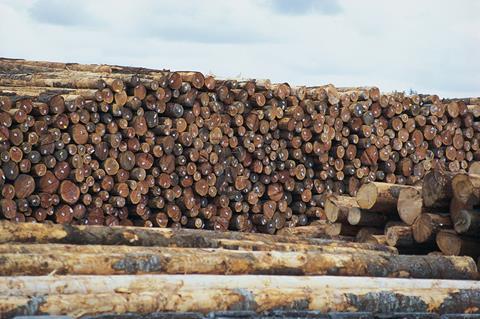As the EU cracks down on illegally harvested timber, what are the industry’s responsibilities?

It is now six months since the European Union Timber Regulation came into force in the UK and the construction industry is already feeling its impact.
The EUTR was put in place to prohibit the placing of illegal timber and timber products on the EU’s internal market. Its main objective is to develop responsible trading practices and ensure that importers within all 28 member states take measures to ensure timber has been harvested in compliance with legislation in the country of origin.
Who does it affect?
The regulation has an impact on two main categories of stakeholder: operators, defined as those who first place timber or timber products on the EU market; and traders, who buy or sell timber or derived products already on the EU market.
Operators carry the lion’s share of legal responsibility. They are responsible for abolishing the chances of wood coming from an illegally harvested source and for implementing a due diligence system. They have to keep records of suppliers, product species, site and country of harvest, volume purchased and evidence of compliance with local legislation.
From this information, risk assessments for each product must be carried out and if the risk is more than negligible, it must be mitigated with extra information and verification from suppliers.
Operators can opt to develop their own due diligence systems or appoint an officially EU-approved monitoring organisation to develop and implement solutions. Across the EU, independent organisations, including Bureau Veritas, have developed due diligence systems to ensure compliance with the EUTR and have lodged their applications with the European Commission to be recognised as official EUTR monitoring organisations.
The responsibilities for traders are less onerous. They now have to keep information about suppliers and customers in order to enhance traceability. This is usually supported by modern accounting practices.
Merchants and contractors in the UK who source materials from within European markets will not be affected as operators but may well be categorised as traders and may therefore have to adapt accounting practices to ensure compliance. But larger construction organisations with global sourcing policies that bring timber products onto the EU market will have to now undertake due diligence.
The National Measurement Office (NMO) Enforcement Authority, working in partnership with Defra, is responsible for enforcing the EUTR in the UK. Its inspectors are empowered to undertake compliance visits and spot checks when reasonable grounds have been identified to believe that timber or timber products have been illegally harvested. Penalties range from notices of remedial actions through to prosecution, including imprisonment, for flagrant or persistent violation of regulations.

What will the impact be?
Despite public consultation by Defra and campaigns run by the NMO, the Timber Trade Federation and others, six months down the line, awareness of the regulation is still comparatively low. Even for those who have realised the impact on their operations, there is still a low level of readiness in terms of due diligence systems that are fit for purpose.
Because of this lack of awareness, there is no evidence yet of the regulation driving up prices. However, with the ongoing pressure on the construction industry to enhance its sustainability credentials, certified materials are increasingly being favoured. With only 10% of the world’s exploited forests currently certified, and Europe positioned as the largest consumer of wood in the world, it is likely that the cost of certified timber is set to increase.
Undoubtedly, the EUTR is demanding. Some construction products - for example, MDF and particle panels - have highly complex supply chains and carry a far higher risk of containing illegal wood. Importers therefore have to invest in a far higher level of scrutiny to manage risk.
The regulation will prove to be a game-changer for many operators. Organisations sourcing timber from multi-suppliers are faced with the daunting task of collating and assessing information presented in any number of languages in order to assess risk and ensure compliance. Buying from FSC- or PEFC-certified suppliers is not an automatic guarantee of EUTR conformity but independent certification will be a valuable asset. Even the largest international operators are turning to independent global organisations to develop and manage their due diligence systems and are moving away from working with the cheapest suppliers towards more stable and longer-term trusted relationships.
The NMO started inspections from the day the regulation came into force. There have been no prosecutions to date but the frequency of these inspections is set to increase, so it is imperative that operators are ready for compliance visits and spot checks.
Although contractors are not the prime target for the NMO, they may well become involved in an inspection as part of an NMO investigation. It is therefore advisable that contractors scrutinise their own procurement policies to avoid becoming involved in an investigation that may have an impact on their corporate reputation.

The key steps to compliance
Here are the essential steps for any organisation involved in either placing timber or derived products onto any EU market, or buying and selling products that are already on the market:
- Assess if the EUTR impacts on your operation
- Identify your legal responsibilities as an operator or trader
- Operators: develop, implement and manage a due diligence system that is EUTR-compliant or appoint an official monitoring organisation to undertake due diligence on your behalf
- Traders: ensure that records of suppliers and customers are kept up to date.
And to avoid any knock-on effects from the EUTR:
- Merchants and contractors: manage any potential impact on your reputation and eliminate any chances of illegal products entering your own supply chain.
Ken Smith is managing director of Bureau Veritas Certification UK & Ireland




























No comments yet